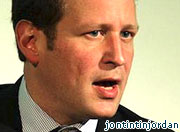Access to pornographic websites could be blocked following the Government’s calls for broadband providers to do more to protect children from sexually explicit material.
Currently parents who wish to protect their children from pornographic websites must use filtering controls.
But internet service providers (ISP) could begin blocking these websites at the source, meaning that people who want to view them would need to ‘opt-in’ to lift the restrictions.
Serious
Speaking to the Sunday Times Ed Vaizey, the Communications Minister, said: “This is a very serious matter. I think it is very important that the internet service providers come up with solutions to protect children.
“I am hoping they will get their acts together so we don’t have to legislate, but we are keeping an eye on the situation and we will have a new communications bill in the next couple of years.”
Mr Vaizey is due to meet a number of the nation’s biggest broadband suppliers, including BT, Talk Talk and Virgin Media to discuss the issue next year.
Children
Claire Perry, the Tory MP for Devizes, said: “Unless we show leadership, the internet industry is not going to self-regulate. The minister has said he will get the ISPs together and say, ‘Either you clean out your stables or we are going to do it for you’.
“There is this very uneasy sense for parents of children that we do not have to tolerate this Wild West approach. We are not coming at this from an anti-porn perspective. We just want to make sure our children aren’t stumbling across things we don’t want them to see.”
However some industry experts have claimed that such a clampdown isn’t feasible.
Trefor Davies, chief technology officer at ISP Timico, said: “Unfortunately, it’s technically not possible to completely block this stuff”.
Controls
And Nicholas Lansman, secretary general of the Internet Service Providers Association, said: “ISPA firmly believes that controls on children’s access to the internet should be managed by parents and carers with the tools ISPs provide, rather than being imposed top-down.”
But Miranda Suit, co-founder of the charity Safermedia, welcomed the news saying: “Technically we know it can be done because the ISPs are already removing child porn after the government put pressure on them.”
A spokesman for the Department of Business, Innovation and Skills said: “Ed Vaizey recently spoke at a Westminster Hall debate on this issue and he confirmed that we would hold a round-table debate on age verification.”
Customers
Andrew Heaney, executive director of strategy and regulation at Talk Talk, said: “Our objective was not to do what the politicians want us but to do what is right for our customers.
“If other companies aren’t going to do it of their own volition, then maybe they should be leant on. Legislation is a sledgehammer but it could work.”
A spokeswoman for Virgin Media said: “We already have an opt-in approach on mobiles. We’ve taken this approach as mobiles are taken out of the home — and kept in a pocket — whereas parents can control what happens within the home and online.
Block
“We’re able to block sites, so it would be possible to do the same on the internet. It is just about finding the right approach.”
At the weekend the Sunday Times magazine published an investigation which revealed the devastating effect that porn had upon the nation’s youth.
One 19-year-old man called Tom explained how he had become addicted to pornography.
Porn
The university student said: “I was nine when I was given my own computer, in my own room, with internet access. My parents were splitting up and not watching me very carefully.
“I would go back and look every couple of months; nothing too hard-core then — just pictures, a bit like Playboy.
“By the time I was 12, I was looking at porn every night and I would carry around printed images for when I went to the bathroom during the day. I had a serious habit. I also had very high expectations of what a girl would be like from all the porn I’d watched.”
Attitude
Earlier this year a report revealed that watching pornography damages young people’s attitude to sex.
Report author Dr Michael Flood cited a study showing that young people who view pornography are more likely than non-users to have had sexual intercourse, masturbated, had homosexual sex and one-night stands.
His findings also show that, for boys in particular, the use of pornography may “encourage their participation in sexual abuse”.
Pornography
Another “clear” conclusion was that “pornography can influence users’ attitudes towards and adoption of particular sexual behaviours”.
Watching pornography was also associated with adolescents learning to view women as sexual objects.
The report, which analysed many different studies on the effect of pornography on children, was published by the Australian Research Centre in Sex, Health and Society.

